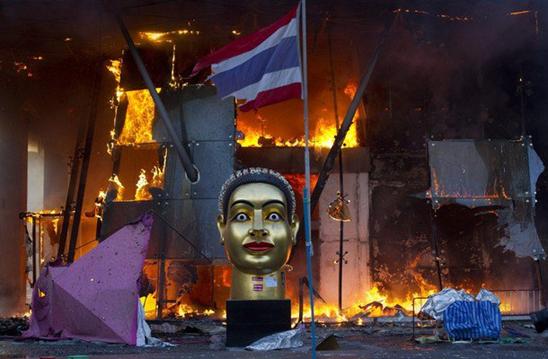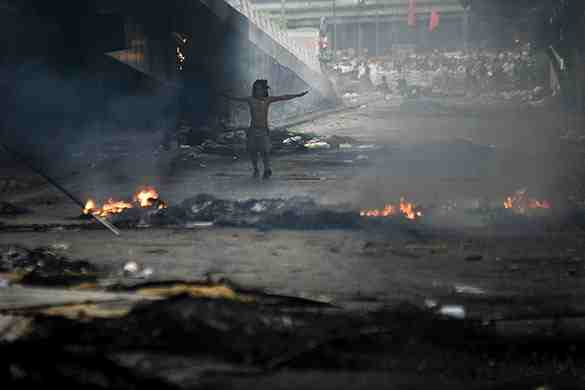
Teaching Filtering Skills More Important Than Ever!
(Thank you everyone for your concern! We are all safe in Bangkok this evening with Government imposed curfew on the city)
 I’m not sure what the news is like about the Bangkok protests outside of Thailand. But inside of Thailand is has been sporadic at best. Leaving people wanting to know and turning to constantly updated streams of information such as Facebook and Twitter.
I’m not sure what the news is like about the Bangkok protests outside of Thailand. But inside of Thailand is has been sporadic at best. Leaving people wanting to know and turning to constantly updated streams of information such as Facebook and Twitter.
Twitter has made it big within our school community. Many teachers, students, and parents have been following different hash tags or lists. Popular Twitter hash tags have been #bangkok #redshirts #redshirt #thaicrisis.
Here’s the issue…..everyone has an opinion and both sides have been using Twitter and the people following the stream there as a way to have their voice heard.
I don’t think that’s a bad things, but are we teaching people that these live streams of information need to be filtered? I wonder how many people in Bangkok took the time to actually look at who was tweeting what, and understood their agenda. For as much good information there was in the stream there was propaganda from both sides.
Whether we like it or not as a global society we have come to expect this type of live stream when events are happening. Whether it’s an earthquake in Haiti or protests in Bangkok, we want to know what’s going on NOW and we don’t want to wait……we have become a nearly now society.
There are two things that concern me:
1) What concerned me the most is the length at which citizen journalists would good to to get the story. Putting themselves in harms way, getting shot at, and in some cases actually dieing for being in the wrong spot at the wrong time. Is nearly now news worth this? Yet it happens and continues to happen as people run around the city trying to get pictures of burning building and putting themselves in harms way.
2) Secondly were the tweets from people outside of Thailand who clearly were not informed on what had been happening over the past 7 weeks or so here in Bangkok and felt the need to add their 2cents to the stream, making it even more confusing on what the actual truth was.
Then there is the mainstream media. The CNNs and BBCs of the world who are trying to capture and tell the story the best they can with very few actual journalists on the ground. They both pulled pictures, tweets, and videos from things that were being tweeted and in at least two stories miss reported, or miss represented what was happening in the image. Scary and very misleading to readers.
 What we need to understand is that if we’re going to live in a nearly now world we all need to learn to filter information and assume that some information is going to be wrong, It’s the nature of reporting live events in almost real time. Things are going to get missed, people will take advantage of real time streams, and we need to know that it’s going to happen!
What we need to understand is that if we’re going to live in a nearly now world we all need to learn to filter information and assume that some information is going to be wrong, It’s the nature of reporting live events in almost real time. Things are going to get missed, people will take advantage of real time streams, and we need to know that it’s going to happen!
I have to say I’m worried that we’re not teaching our students, who this ‘nearly now’ world is going to affect the most, how to use it properly. How to filter the good from the bad, and the fact from the opinion. We talk about this in regards to books…..but I do not know of any school, anywhere in the world that talks about this when it comes to live streaming information on the web……and people….this is the future of news….the Evening News at 6pm is dead!
As I myself was wrestling to keep up with the news streams today, I was talking with 10th graders about their digital profiles. As we were waiting for a site to load a girl in the front row got frustrated and said.
“Why’s it taking a million years to load!?“
Reality….it might have taken 7 maybe even 10 seconds for the page to load, yet she was frustrated it wasn’t loading faster.
And we’ve all been there, frustrated that 10 seconds to access a websites literally halfway around the world was too slow.
We live in a nearly now world, we need to stop pretending we don’t and start preparing students to be responsible global citizens in it!
Because in a nearly now world 10 seconds feels like a million years.








Jeff, love this blog post. This question has been always asked ” what is truth?” especially in the media reports. As old western proverb says ” believe half of what you see, and none of what you hear.” This sounds too suspicious though.
I think that speed with which we can access and consume information is the huge shift that most old fogies like us are having trouble understanding. My sense is that the vast majority of educators still aren’t “here” in this space where we create our own up to the moment news feeds around the specific things we care about and make judgments as to the “noise” or “signal” at the moment of interaction. They’re still reading the New York Times (print or online) or other more traditional media which lessen the participation or filtering requirement that most of us out here now routinely employ in our workflow, the same one kids are going to have to employ. (They’re already doing it to some extent, just not very well. Which is not to say that I get an A+ here either, btw.) All of which says a lot about the importance of relevant PD for the adults in the room.
I agree that most people are not creating their own streams of news on a daily basis. Which makes what I’m witnessing even more disturbing. During this recent crisis here in Bangkok people were coming to me and asking how you use Twitter to keep up on the news. I show a few, who show a few, and next thing you know everyone is keeping up with the news for this event. Because they had a purpose for the stream they followed the stream. The bigger issue was I’m not sure even the old fogies were able to tell the “noise” from the “signal” it takes time and practice. And jumping in with both feet during a crisis is the wrong time to learn. There were many mis-leading stories in the Twitter stream and more than once I heard parents and teachers quoting information that was not factual from the Twitter stream. It’s scary that these feeds will fade now that the crisis is over and people will not continue to practice this “skill” until the next crisis comes along. I’m actually more worried about the adults than the kids.
Us “old fogies” expect that the 6 o’clock news is filtered for us, has been verified and is therefore true. Unfortunately during the recent crisis in Thailand, there was (or still is) a major language barrier. This has seriously hurt the quality of the English language news we received. While BKK was buring I found the best up-to-date info on facebook from Thai friends – information on Thailand, from Thais in Thai. The stuff floating around on Youtube in Thai is particularly interesting. Do a a search in English on Youtube and you get video with no dialogue. Now I regret that I haven’t learned how to use my Thai language keyboard. Maybe Tech Help on Monday?
From time to time, but on a consistent basis, we all need refresher courses (as it were) in discerning fact from fiction. A good idea to refresh comes from Benjamim Franklin, who said,”it is the first responsibility of every citizen to question authority.” Whether we’re sixteen or sixty,”The truth is rarely pure and never simple” (Oscar Wilde, “The Importance of Being Earnest”).
This is so true! Everyone makes their own opinion about things. It always turns out to be something different than what it really is. It is going to happen. We need to start teaching our children how to sort out the good from the awful. This “nearly now” world is a reality so we need to prepare out students for it. Thanks for the thoughts!